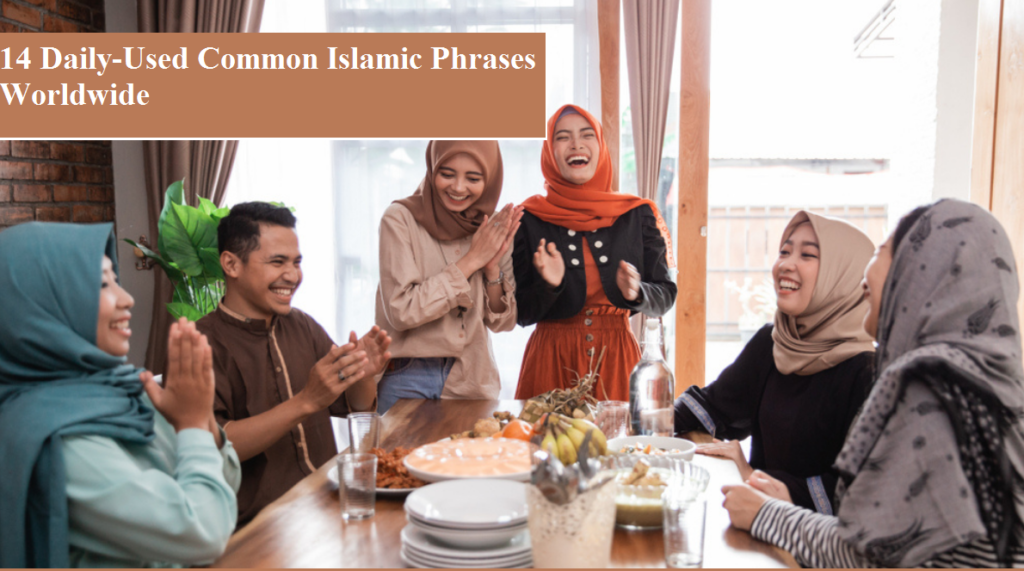14 Daily-Used Common Islamic Phrases Worldwide
With over 1.8 billion Muslims worldwide, the influence of Islamic culture and traditions extends far beyond religious practices. Common Islamic Phrases, or “duas” (supplications), have made their way into the daily lives of millions. Whether you’re a Muslim looking to deepen your understanding or a non-Muslim curious about these common Islamic phrases, this blog will help you grasp their meanings and significance.
Bismillah

Meaning: In the name of Allah
The phrase “Bismillah” is recited before embarking on any task to seek blessings and protection from Allah. It’s a reminder that all actions should begin with the name of the Creator.
Alhamdulillah
Meaning: All praise is due to Allah
“Alhamdulillah” expresses gratitude and acknowledges that all praise, thanks, and appreciation ultimately belong to Allah. It is frequently used to show appreciation for life’s blessings, big or small.
Ash-shukrulillah
Meaning: Thanks be to Allah
Similar to “Alhamdulillah,” this phrase is used to express gratitude. It emphasizes the act of giving thanks to Allah for His blessings.
SubhanAllah
Meaning: Glory be to Allah
“SubhanAllah” is a phrase used when witnessing something awe-inspiring or magnificent. It’s a way of acknowledging the greatness and majesty of Allah.
Allahu Akbar
Meaning: Allah is the Greatest
“Allahu Akbar” is one of the most recognizable Islamic phrases, often heard in prayers and during moments of great significance. It reminds Muslims that Allah’s greatness surpasses all else.
MashaAllah
Meaning: What Allah has willed
“MashaAllah” is used to acknowledge that an event or accomplishment is due to Allah’s divine will. It’s often said when admiring someone’s achievements.
Jazakum Allahu Khayran
Meaning: May Allah reward you with goodness
This phrase is a way of expressing gratitude to someone. It’s used to convey appreciation for a kind gesture or help received.
InshaAllah
Meaning: If Allah wills
Used to express a hope or intention for the future, “InshaAllah” reminds us that our plans are always subject to Allah’s will. It’s a humble way of acknowledging uncertainty.
La hawla wala quwwata illa billah
Meaning: There is no power nor strength except through Allah
This phrase is often recited in times of distress or difficulty, seeking strength and support from Allah.
Ameen
Meaning: May it be so
“Ameen” is said at the end of prayers, supplications, and wishes, signifying agreement with what has been said and a request for it to be granted by Allah.
Yarhamuka Allah
Meaning: May Allah have mercy on you
Used as a response when someone sneezes, it’s a polite way of saying “bless you.” It also serves as a reminder of Allah’s mercy.
Astaghfiru Allah
Meaning: I seek forgiveness from Allah
This phrase is a heartfelt acknowledgment of one’s sins and a plea for forgiveness from Allah.
Baraaka Allahu feek/feekum
Meaning: May Allah’s blessings be upon you
“Baraaka Allahu feek” is a way of wishing blessings upon someone, acknowledging that any good you receive is due to Allah’s blessings.
As-salaamu ‘alaykum
Meaning: Peace be upon you
This common Islamic greeting is a beautiful expression of peace and goodwill, used when meeting and parting.
The reply is “Wa ‘alaykum as-salaam,” signifying “May peace be upon you as well..
In a world where understanding and respect for different cultures are paramount, knowing and appreciating these common Islamic phrases can foster better relationships and appreciation for the rich tapestry of human diversity. Muslims and non-Muslims alike can benefit from the wisdom and humility conveyed through these simple yet profound expressions. So, whether you’re expressing gratitude, seeking forgiveness, or simply exchanging greetings, these Islamic phrases hold a world of meaning within them.
Other articles and publications:
- +1 (855) 226-2848
- P. O. Box 3125, Conroe, TX 77304
- studioarabiya.com







